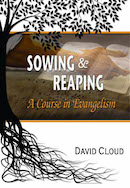866-295-4143, fbns@wayoflife.org

The New Testament, though, does not give any pattern for conducting a specific corporate worship service in the churches. None whatsoever. Those who try to find biblical justification for the “worship service,” cannot find it in the writings of the Apostles. They must go to the Old Testament temple worship or to the book of Revelation, but the pattern for the churches is the Apostolic writings. There are three key words for worship in the New Testament: worship, praise, and glorify, and none of these are used in the context of a corporate church worship service. The only time the word “worship” is used in the Acts or Epistles in connection with the church services is in 1 Cor. 14:25, and it is speaking of individual worship, not corporate worship. Likewise, the words “praise” or “glorify” are never used in the New Testament of corporate worship in church meetings. They are used, rather, of individual praise to God through private thanksgiving and godly living (Acts 2:47; Rom. 15:5-6; 1 Cor. 6:20; Phil. 1:11; Heb. 13:15; 1 Pet. 4:16).
This does not mean that it is wrong for churches to worship the Lord together. Just the opposite. Certainly, that is what we are to do at all times, including during the church services. In fact, there is a gross lack of conscious worship in the average church service in strong Bible-believing congregations today. Everything is treated with such a lack of solemnity and with such a lack of heart-felt praise directed toward God. Even the singing is approached in a “ho hum” manner, more as a ritual that we go through than an occasion of directing one’s heart to God.
What, then, is the difference between the typical contemporary worship service and the biblical pattern for worship in the church?
(1) Biblical worship has no emphasis on the use of music. The two mentions of music in the New Testament epistles focus as much on edifying the saints as on singing unto the Lord (Eph. 5:19; Col. 3:16). In fact, biblical worship emphasizes that God is worshipped through everything done in the church rather than merely through one particular type of worship offered to Him via a praise time (1 Pet. 4:11). In direct contradiction to this, contemporary worship focuses almost exclusively on one type of worship to God, that being the worship that is associated with contemporary music.
(2) Biblical church worship is submitted to the apostolic commandments, which require that everything be done decently and in order, that there be no confusion, that women cannot lead, etc. (1 Cor. 11:2; 14:37). This means that all of the unscriptural things commonly associated with contemporary worship, particularly in charismatic circles, are rejected.
(3) Biblical church worship emphasizes the understanding rather than the emotions (1 Cor. 14:15). The emphasis is not on “feeling God” but on understanding and knowing God through the truth of His Word. We see this reflected in the traditional hymns. The old hymn writers aimed to edify the understanding rather than to create an emotional high. In contemporary worship, though, “songs are chosen in order to induce feelings in the worshippers. . . . [to induce] an altered state of consciousness by flagrant manipulation” (Alan Morrison, The New Style of Worship and the Great Apostasy).
(4) Biblical church worship emphasizes the unity of the faith rather than the ecumenical concept of unity in diversity that is so common in contemporary Christian worship (Rom. 15:6; Matt. 15:9; John 4:24). There can be no true worship unless there is complete commitment to sound Bible doctrine. The hodgepodge of doctrine present in the typical ecumenical setting does not glorify God and is not acceptable to Him, regardless of the zeal and enthusiasm exhibited during the worship sessions.
(5) Biblical church worship requires moral purity and separation from the world (Rom. 12:1-2; Phil. 1:11), in contrast to the contemporary worship which typically ignores separation and which builds bridges to the world through the use of the world’s music, dress, etc. Typical contemporary worship also ignores the necessity of moral purity and is very careless about how Christians live. It is enough that they enter into the “worship times” with great enthusiasm. If they divorce their spouses and commit adultery and are crooked in their business practices and dress like harlots and watch filthy television programs and Hollywood movies, that is overlooked. Among churches that incorporate contemporary worship styles, there is little or no preaching against the world in any plain and practical sense and little or no church discipline exercised. There are exceptions, but this is the rule.
(6) Biblical church worship is constantly vigilant of spiritual dangers (1 Pet. 5:8; 2 Cor. 11:1-4). At least 11 times the Apostles warn Christians to be “sober.” Pastors are to be sober (Titus 1:8); aged men are to be sober (Titus 2:2); the women are to be sober (Titus 2:4); young men are to be sober (Titus 2:6); the wives of pastors and deacons are to be sober (1 Tim. 3:11). 1 Thessalonians 5:6 and 1 Pet. 5:8 explain what it means to be sober; it means to be spiritually alert and watchful and vigilant. To the contrary, though, contemporary worship teaches people to open up unreservedly to spiritual influences without any sense of danger or fear of deception. They instruct the people to “let go and let God,” to “be open and vulnerable,” to “open yourself to the Spirit,” to “invite the Holy Spirit to come and do his thing,” to “be ready for the unusual.” There is absolutely nothing like this taught in the New Testament scriptures. The Apostles and early churches did not practice anything like this. When the Corinthians began to dabble in similar things and were allowing confusion and disorder to reign in their midst, the Apostle rebuked them and corrected their error.
- Receive these reports by email
- www.wayoflife.org
______________________
Sharing Policy: Much of our material is available for free, such as the hundreds of articles at the Way of Life web site. Other items we sell to help fund our expensive literature and foreign church planting ministries. Way of Life's content falls into two categories: sharable and non-sharable. Things that we encourage you to share include the audio sermons, O Timothy magazine, FBIS articles, and the free eVideos and free eBooks. You are welcome to make copies of these at your own expense and share them with friends and family. You may also post parts of reports and/or entire reports to websites, blogs, etc as long as you give proper credit (citation). A link to the original report is very much appreciated as the reports are frequently updated and/or expanded. Things we do not want copied and distributed are "Store" items like the Fundamental Baptist Digital Library, print editions of our books, electronic editions of the books that we sell, the videos that we sell, etc. The items have taken years to produce at enormous expense in time and money, and we use the income from sales to help fund the ministry. We trust that your Christian honesty will preserve the integrity of this policy. "For the scripture saith, Thou shalt not muzzle the ox that treadeth out the corn. And, The labourer is worthy of his reward" (1 Timothy 5:18). Questions? support@wayoflife.org
Goal:Distributed by Way of Life Literature Inc., the Fundamental Baptist Information Service is an e-mail posting for Bible-believing Christians. Established in 1974, Way of Life Literature is a fundamental Baptist preaching and publishing ministry based in Bethel Baptist Church, London, Ontario, of which Wilbert Unger is the founding Pastor. Brother Cloud lives in South Asia where he has been a church planting missionary since 1979. Our primary goal with the FBIS is to provide material to assist preachers in the edification and protection of the churches.
Offering: Offerings are welcome if you care to make one. If you have been helped and/or blessed by our material offerings can be mailed or made online with with Visa, Mastercard, Discover, or Paypal. For information see: www.wayoflife.org/about/makeanoffering.html.





